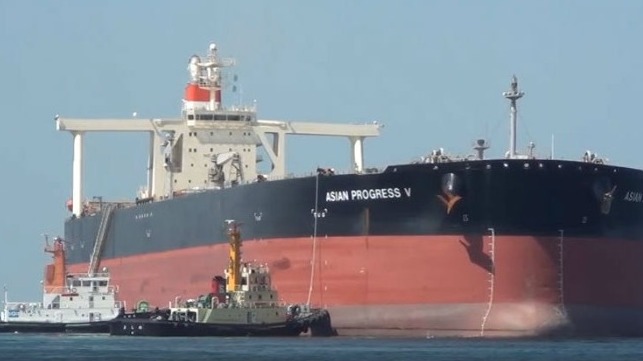 File image
File image
By The Maritime Executive 02-25-2020 05:10:00
Maritime consultancy MSI has issued a new analysis of how the coronavirus epidemic is affecting shipping’s main sectors – and how it may impact each in the future depending upon the extent of the outbreak’s spread.
Dry bulk may be seriously affected, as China imports about 40 percent of the world’s seagoing dry bulk cargo. With extended factory closures and worker shortages, demand for bulkers has already been affected. MSI forecasts that China’s steel production will fall about three percent this year – but ore imports will likely increase by the same amount, with blast furnace mills continuing production and electric arc furnace mills (which rely on scrap rather than ore) slowing down.
In coal, Chinese authorities are likely to protect domestic producers, MSI predicted, causing coal imports to fall by about six percent over the year. The drop in imports could be less if China’s coal mines have difficulty mobilizing their workforce due to public health measures.
“Combined, these expected impacts on trade are not ruinous. The most significant risk at the moment, though, is the fragility of the transport network. Even if fundamentals support imports, without an effective supply chain from ports through to rail and road networks in China the dry bulk industry will suffer,” MSI cautioned.
The tanker market has already taken a significant hit, and IEA expects that with the extent of the economic shock in China, the world’s oil market will actually contract in the first quarter – an outcome that has not occurred since 2009. Chinese oil demand could fall by as much as 25 percent in February alone, and China is responsible for nearly a quarter of the global crude oil trade.
The impact comes against the backdrop of other negative factors for tanker earnings. The early-year boost that tankers received from the implementation of IMO 2020 and the sanctions on COSCO Dalian’s fleet have faded. “What we have seen so far from coronavirus is an escalation of these
trends, with further downside risk if there is further escalation,” MSI said.
For all of the news coverage of China’s container ports, ocean freight may be the least affected of shipping’s three main sectors. The coronavirus outbreak has lengthened and deepened the usual shutdown in production that normally occurs during the Chinese lunar new year, and carriers have responded by blanking dozens of sailings. MSI forecasts that so long as workers return to factories within February, the impact on long-haul routes will be more or less limited to the first quarter of the year. Intra-Asian routes may see a larger impact. In the worst case scenario, with factory disruption extending into the second quarter, global headhaul traffic could even contract by one percent over the course of 2020, MSI predicted.
The reduction in ocean freight demand is likely to be felt in time chartering, MSI said. “Certainly within the Far East . . . there is going to be an increase in the idle fleet of smaller containerships in particular as liner companies take a cautious approach taking on new tonnage,” the firm predicted.
source: www.maritime-executive.com


